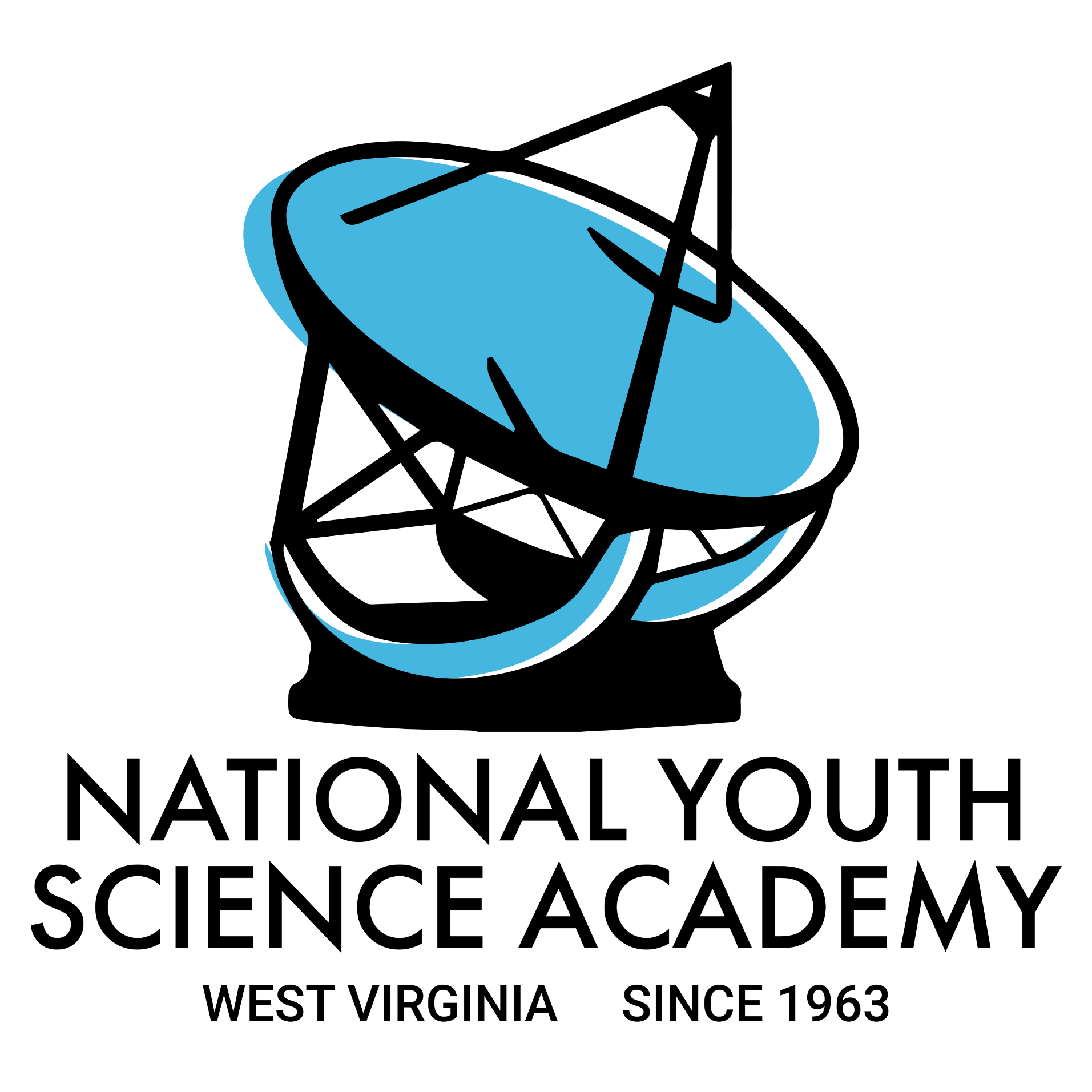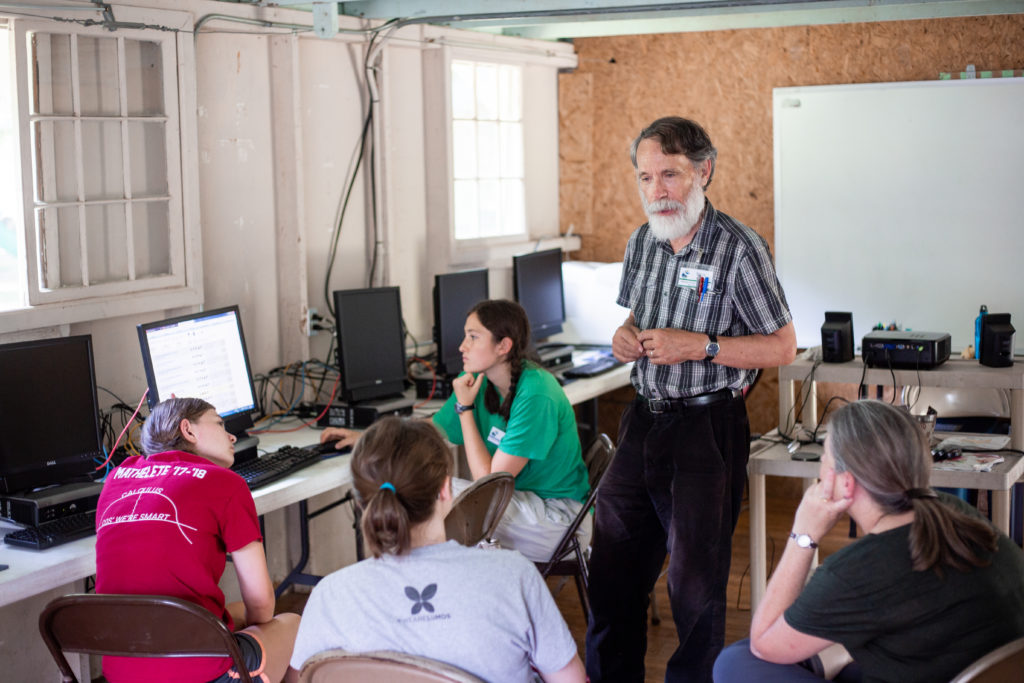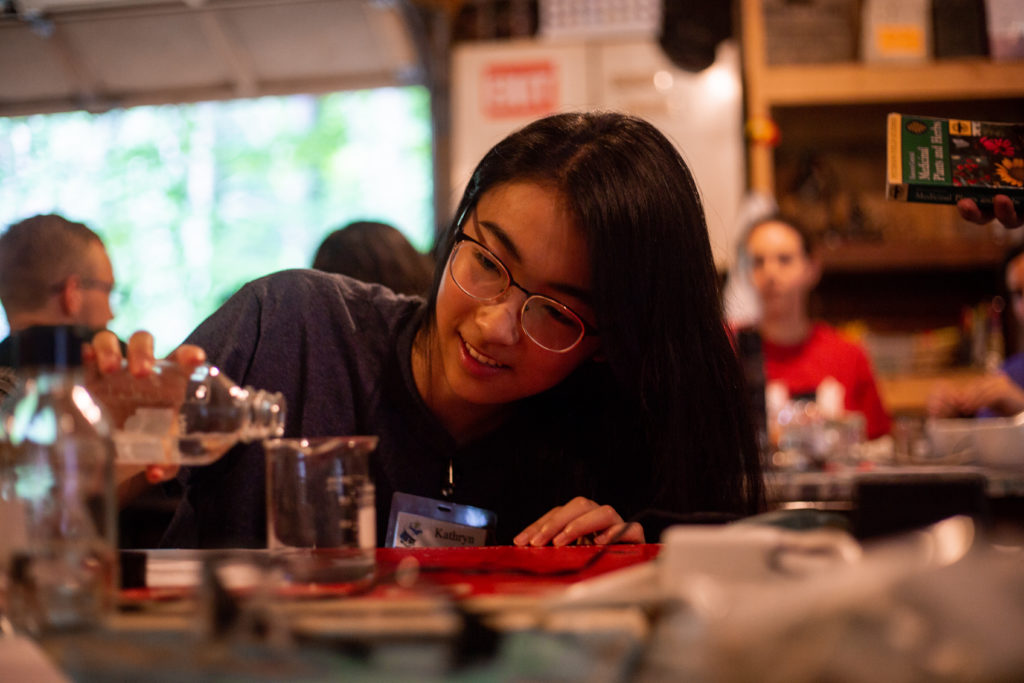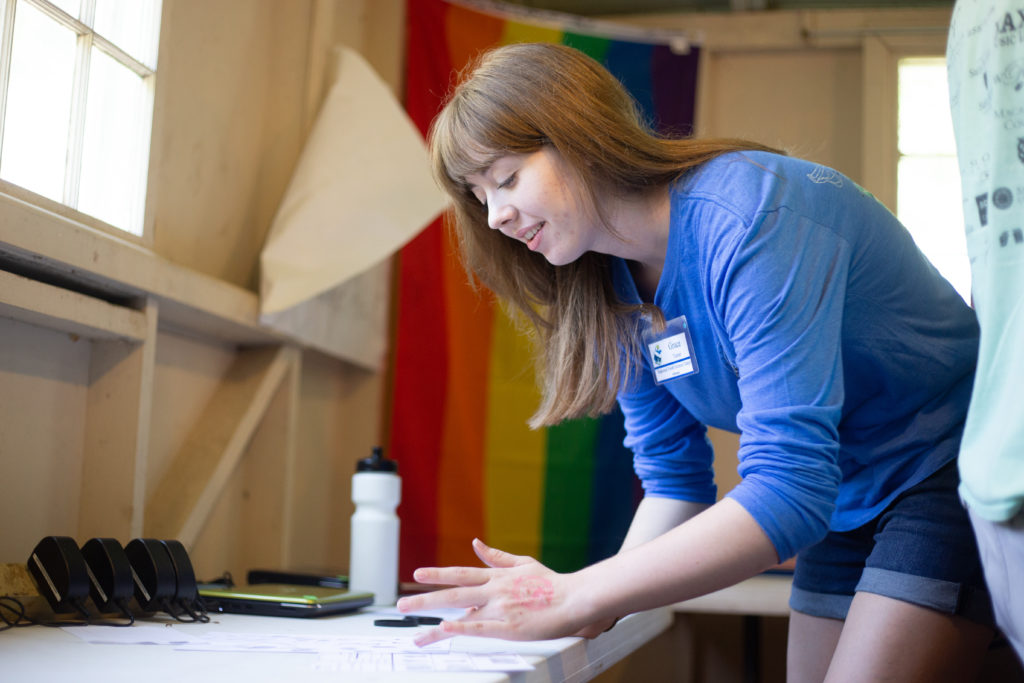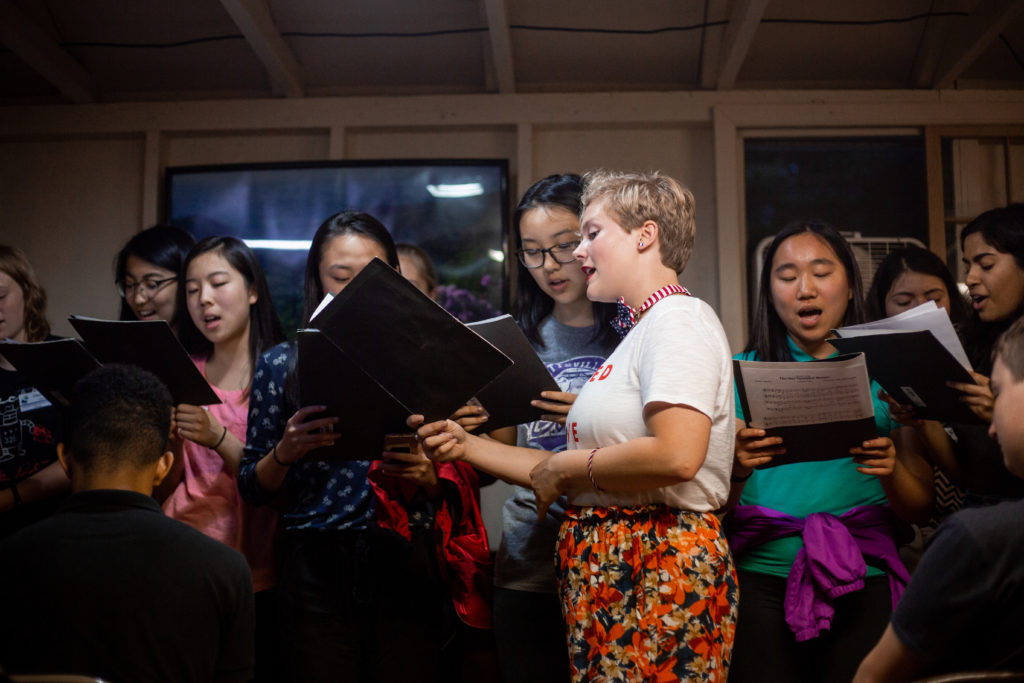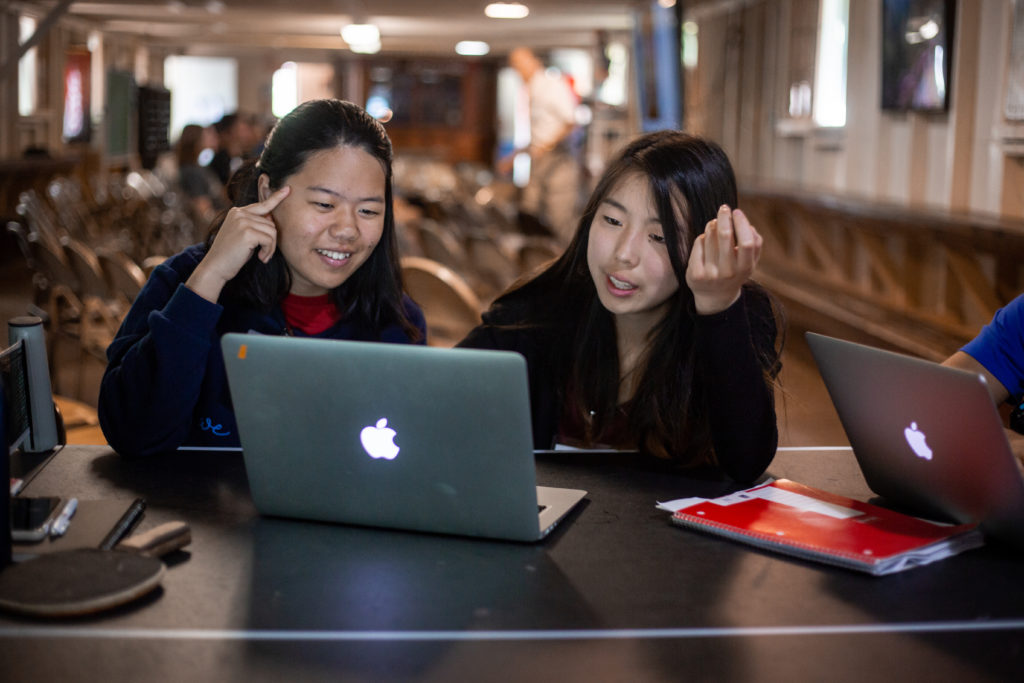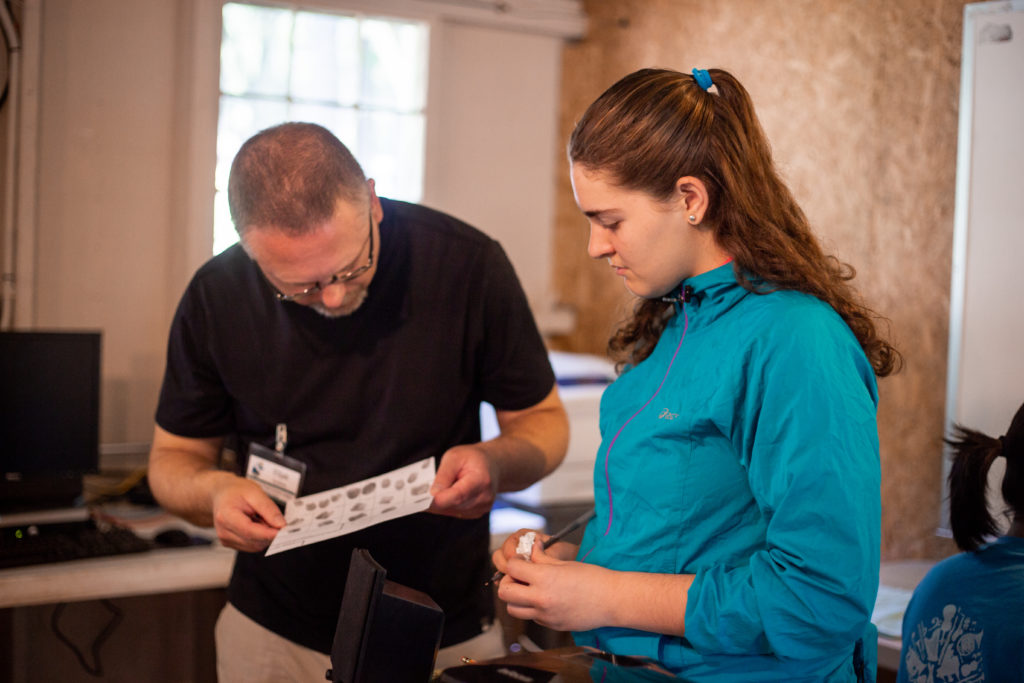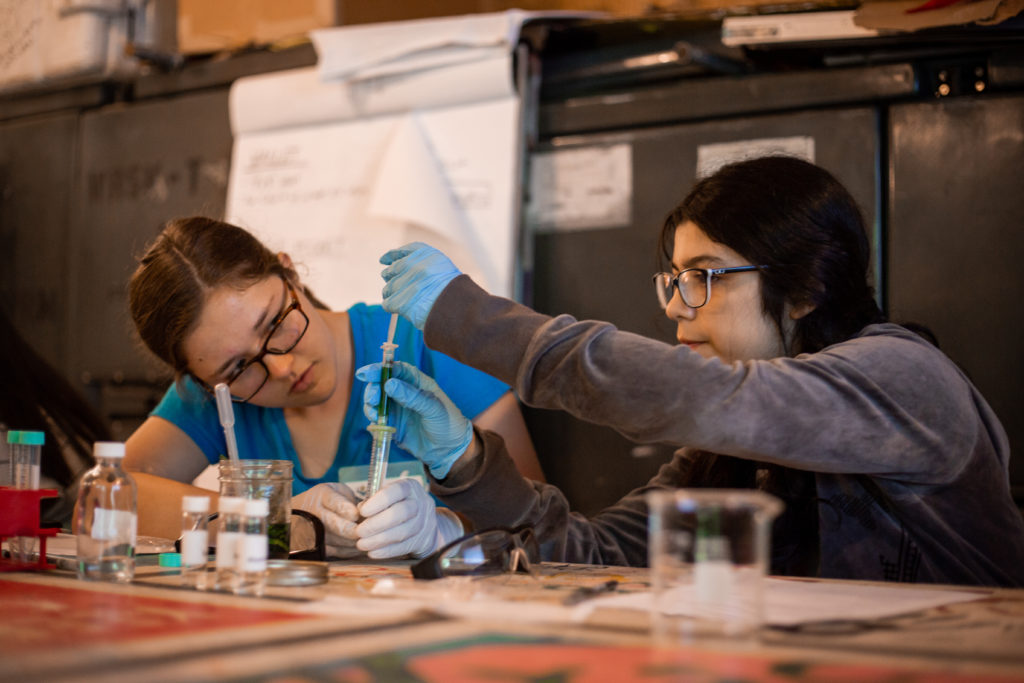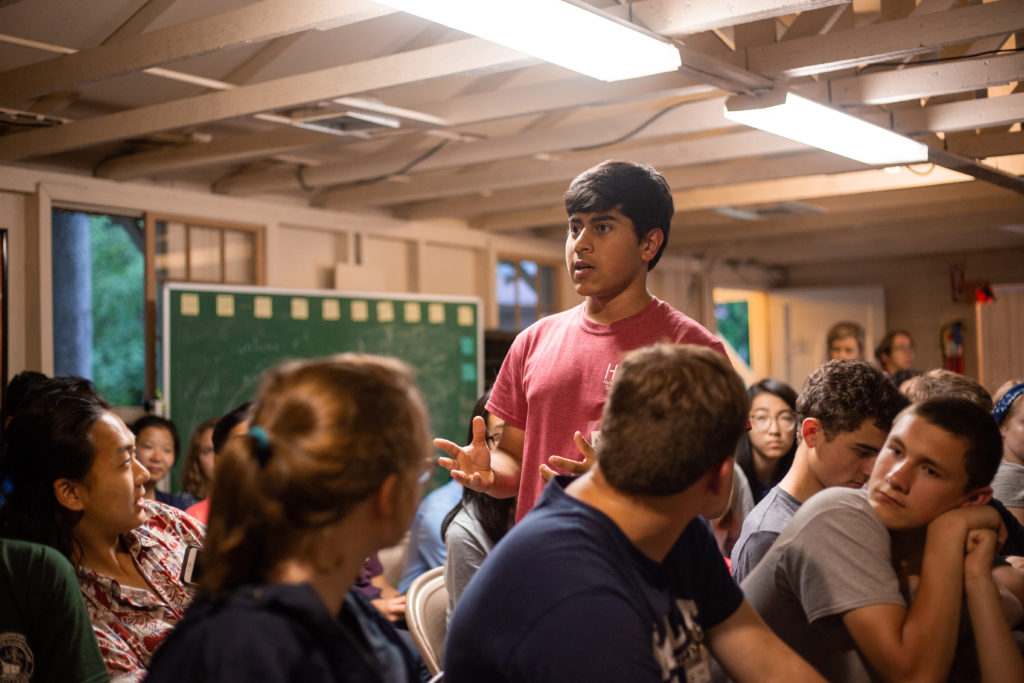BARTOW – Steve Blasberg used a projector on top of a picnic table. He carried three pens in his pocket. One was red. He is a teacher.
A white-bearded and bespectacled mathematician, Blasberg described how to use math to predict a person’s chances of dominant or recessive genetic traits, like hair or eye color. He explained, for example, how inbreeding compounded the chances of hemophilia, a bleeding disorder and recessive trait, among the European royal families. Next to him, musical instruments sat in their cases.
It was the second full day of National Youth Science Camp here in Pocahontas County, West Virginia. Four days prior, promising recent high school graduates from across the country and world had flown into Yeager Airport in Charleston. They spent the night at the University of Charleston, then headed to Camp Pocahontas for three and half weeks of outdoor adventure and STEM (science, technology, engineering and mathematics) education.
Elizabeth Skelly, of Saint Charles, Missouri, signed up for the directed study in this dining hall/performing arts center/math classroom. She is interested in math and wants to pursue nanochemistry. Specifically, she wants to use nanochemistry to reduce cancer treatment side effects on healthy parts of the body.
She appreciated the examples of math applications.
“I hope that in college I can merge the math that I love and the chemistry research that I find interesting,” she said. “This class showed me there are possibilities. It does happen and you can do it.”
Every year, the National Youth Science Camp is held at this remote campground, in the National Radio Quiet Zone in the heart of the Monongahela National Forest.
In recent days, Blasberg and other instructors from the academic and professional worlds, many former delegates, have led directed studies on tiny houses, robot navigation and candy and chocolate-making, among other topics. Staff members, many college students and recent science camp delegates, have also led seminars on philosophy, jazz improvisation, swing dancing, and foreign languages.
One afternoon, delegates sat outside on benches under maple and spruce trees while Ryan Haupt, a Charleston native and Smithsonian research fellow, set up his chalkboard to present his lecture on sloths.
Another sunny afternoon, Blasberg, a math instructor of more than 40 years at West Valley College in Saratoga, California, plopped down on one of those benches and chatted about German short stories with a staff member and former delegate.
For Blasberg, this year marks 50 years since he attended in 1968. At the time, he already knew he wanted to be a math teacher. But at camp, he met other young people who stuck out in high school — the ones who were nerdy, who got good grades.
“For most kids, this was the first time they had been around other people just like them,” he said. “They didn’t have to be embarrassed, and they didn’t have to hide.”
Camp began in 1963, as part of West Virginia’s Centennial Celebration. Since that time, it’s brought more than 5,500 young people from around the country and world to the Appalachian Mountains of West Virginia.
“I didn’t really understand how gorgeous it was,” Blasberg said.
“I love driving to camp,” he added, noting that he hit a deer for the first time a few days prior.
Dr. Paul Miller, a 1987 delegate from Wyoming, met his wife Betsy through science camp. Both are former science camp directors.
Now he’s an associate professor at West Virginia University who specializes in beginning physics for engineers and future elementary school teachers. Science camp feels like home. His 9-year-old daughter, Nora, ran from activity to activity.
“The feeling was I had found my people,” he said.
Camp Pocahontas is nestled among some of the highest peaks in West Virginia, near the Virginia stateline. Behind the dining hall, a creek trickles over rocks and under a wooden footbridge.
Hammocks hang under the trees near the flagpole. On some days, the sound of delegates playing violin wafts from outside the performing arts center to the center of the green, and to the front porch of the dining hall where alumni catch up and drink coffee.
The first day here, Reeny Botros, a delegate from Kansas, felt like she was going to hyperventilate.
For fifty-five years, National Youth Science Camp has brought straight-A students to Pocahontas County. Mathletes. Members of the honor society.
Some of them haven’t made a fire, hiked, mountain biked, or camped. Some of them have never stayed in such close quarters, needed shower shoes, or climbed into a bunk bed.
“I was like crying in my bed low-key,” Botros, a delegate from Kansas, said.
She paused. “I was actually crying,” she said, laughing.
Sweat-soaked, delegates have just returned to their cabin from their first overnight backpacking trip in the Monongahela National Forest. Cheese illustrations hang from the ceiling, in keeping with the cabin’s “cheese” theme.
Seeing a mouse during one of those first days hadn’t helped.
“A week ago if you would have told me to get into bed I would have been like huh-uh,” Botros said. “We’re just not used to all this.”
It was the fifth full day of camp — a week since they arrived — and Botros and several other young women were taking turns lounging in a hammock in the middle of their cabin.
Francesca Garafulic Justiniano, who went climbing, has asthma. She’s used to taking it easy during physical activity. But during assisted rock climbing, she got to pause and breathe. And the cheers helped.
A delegate from Bolivia, she said she realized she was capable of more than she thought. Now she wants to find out if there are climbing centers back home.
“I wanted to do something a little out of my comfort zone,” she said. “I was very proud of myself when I got to the top.”
Many delegates also haven’t been to West Virginia, and in particular, the radio quiet zone, where there is no cell service.
“I tend to use my phone a lot,” Garafulic Justiniano said. “The first few days, I just put my phone away and focused on the now.”
Delegates don’t know each day’s schedule in advance. And camp promotional materials don’t offer much detail. “A lot of people thought we were going to join a cult,” Botros laughs.
But Tia Vierling, a cabin mate from Idaho, said she figured out why by day two.
“It feels immersive but not stressful because I know nothing bad is going to happen,” she said.
She added that she knows it’s possible, but also knows that staff members are watching out for her.
“There’s things to look forward to, even if you don’t know what they are,” she said.
The cabin mates were swapping stories. Before starting a fire, Vierling’s group met a West Virginian.
“He gave us free wood,” she said. “He made our fire in under a minute.”
A few gasped when they found out another backpacking group got ice cream or had bathroom access.
“I’m going home,” Botros joked. “I peed in the woods yesterday.”
She and several cabin mates had mountain biked for 25 miles during their backpacking trip. It wasn’t their first choice.
On the way back, all Botros could think about was climbing up that bunk bed ladder.
“Overall I’m a different person,” she said. “I’ve never pushed myself that much. I just know that I can do more than I think I can.”
Several bonded over being in the slow group. It helped them feel less embarrassed.
Marisa Dobbins, a delegate from New Hampshire, said mountain biking encouraged her to talk to new people. “Afterwards, I felt really close to those people because we had gone to our limits,” she said.
Later, these AP scholars and science fair winners circled a campfire. A staff member thanked Dobbins, one of the valedictorians, for starting a fire with ease during the trip.
Others were teased for things like slip-n-sliding down a muddy trail in tennis shoes. One of the delegates who was scowling at the airport is smiling.
They joined for a cover of “This is Me,” by Keala Settle. “Look Out ‘Cause Here I Come,” they sang. After, they sang the chorus and stumbled through the verses to “Country Roads.”
A more extended photo gallery can be found here.
